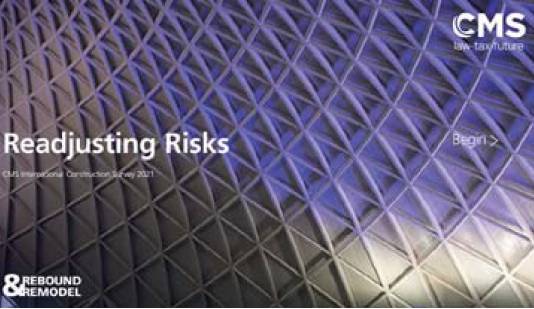Readjusting risks
Adrian Bell, Co-head, Infrastructure, Construction and Energy Disputes Group CMS Cameron McKenna Nabarro Olswang
IN our analysis of the construction market, Readjusting Risks, CMS surveyed over 50 senior members of the industry and conducted interviews with leading figures that have key responsibilities for construction contracts, projects and the resolution of disputes. The survey drew in responses from across the world, especially Europe, Middle East, Africa, Asia and Latin America.

The report showcases the primary trends in the market, from the increasing enthusiasm for arbitration as a preferred form of dispute resolution, along with mounting preferences for mediation and other forms of alternative dispute resolution, to industry-wide recognition that keeping better records and managing change more effectively are vital to minimising tensions and potential disputes.
Many of the key institutions have come up with expedited arbitration processes, a shorter form process that enables the parties to have a decision or award much quicker, at the expense of either streamlining or removing completely some of the traditional steps you would have in arbitration, like witness statements, document production and other aspects. It is much easier to tailor the process to your needs.
The value in predicting and constantly addressing risks and points of tension in ‘real-time’ during the course of a project is outlined within the report. The majority of survey respondents now either always or often consult internal legal/contract management or external counsel at the outset of a project to identify areas of risk and put strategies in place to mitigate these.
The survey also shows that most participants will either always or often attempt to resolve issues during the course of the project, rather than dealing with them collectively at the end. A significant proportion will also invest in legal advice during the course of a project to achieve early resolution of conflict points.
The findings confirm that time and cost continue to be the cause of conflict points and disputes, with COVID-19 causing additional strain due to lockdowns, social distancing and other restrictions on the importation of materials and the like. The construction industry is pretty resilient. It found ways to get on with projects and find sensible ways to deal with issues collaboratively. Employers have realised that if they’re too heavy handed, then the contractors will become insolvent or fall away. It is really a question of being more pragmatic and ‘nursing’ projects over the line.
Nearly all our survey respondents acknowledge that there is further room for improvement in how risks are managed during the course of a project. The highest number of survey participants identify keeping better records as an important means of managing risk. Managing change better, submitting notices within the prescribed time limit, earlier identification of risk during the tender phase and better management of the supply chain and contractors are also thought to be areas where the management of risk can be improved.
Keeping better records is becoming even more important than ever, because arbitral tribunals are becoming much less interested in witness evidence. They are much more keen to see what the parties were saying at the time these issues were arising and the contemporaneous documentation. When putting together a robust case, either to pursue or defend an arbitration, it really is going to succeed or not on the strength of the contemporaneous documents. It’s always been important, but it’s probably more so than ever.
The COVID-19 crisis is an extreme example of the many unexpected incidents that impact construction projects, resulting in heightened tensions and disputes amongst stakeholders. The pandemic has accentuated many of the typical frictions that occur in the construction industry, as well as highlight new challenges. No matter how experienced or astute the parties to a project are, when negotiating and concluding contracts, there is always the potential for an unforeseen event to cause major disruption, resulting in commercial pressures and financial losses.
Key statistics
95% of respondents consider there to be room for improvement in how risks are managed on projects
80% see cost and time as key risks on projects
73% believe that keeping better records is a primary factor in managing risks during a project compared to just 38% in 2020 – a 35% increase
Adrian Bell, Co-head of the Infrastructure, Construction and Energy Disputes Group, CMS Cameron McKenna Nabarro Olswang
adrian.bell@cms-cmno.com @adrianjbell
